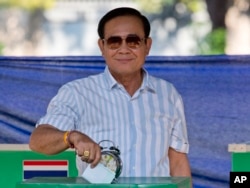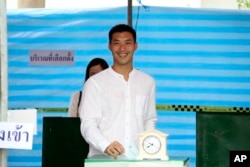Thai voters are going to the polls Sunday for the first time in nearly five years.
Thailand’s military junta took power in May 2014, when then-army chief Prayuth Chan-ocha led a coup that toppled the government.
Junta leader Prayuth said Sunday morning after voting, “I hope everyone helps each other by going to vote today as it’s everyone’s right.”
Some 51 million Thais are eligible to vote.
Observers see the elections as a struggle between democracy and military rule.
Prayut has said that if he wins, voters would be returning his junta-led country to a “democracy.”
The coup, Thailand’s 13th since 1932, ousted then-Prime Minister Yingluck Shinawatra and caused international outrage.
Observers say the chances of the Thai junta losing power at the ballot box appear remote.
Under a new constitution, the next Thai prime minister will be elected at a joint sitting of parliament. The 250 members of the Senate will all be appointed by the military, with political parties only contesting the 500 seats in the House of Representatives on Sunday.
That heavily favors Prayut, who is hoping to legitimize his leadership by standing for prime minister.
The Southeast Asian Press Alliance has expressed concerns over his leadership, citing a crackdown on press freedoms.
The Asian Network For Free Elections has warned of “inconsistencies and irregularities” in the lead-up to the poll.
The U.S. government has issued an advisory to its citizens, warning that travelers may encounter a heightened police and military presence throughout the country, particularly near polling stations.
The U.S. is urging its citizens to abide by Thai laws that prohibit criticism of the monarchy, avoid any election-related large gatherings and monitor international and Thai media before, during and after the elections.








